Africa-Press – Namibia. President Netumbo Nandi-Ndaitwah has positioned Namibia as a global leader in women’s empowerment, telling world leaders that her country has made historic progress in closing the gender gap and is committed to doing even more to ensure women’s full participation in society.
Speaking at the High-Level Meeting of the 30th Anniversary of the Fourth World Conference on Women at the United Nations General Assembly Hall, on Monday, President Nandi-Ndaitwah reminded delegates that Namibia’s achievements are not by chance, but the result of deliberate policies and strong political will since independence.
“Gender equality and women’s empowerment have been key priorities for Namibia’s government since our independence in 1990. We have shown strong political will through adopting international commitments, including the Beijing Declaration and Platform
for Action, which we domesticated in our national gender policies,” said the President.
Milestone
President Nandi-Ndaitwah told the gathering that Namibia had reached a milestone that few countries in the world can claim. “As President, I am proud to highlight our historic milestone. Namibia now has a female President, Vice President, Speaker of the National Assembly and Secretary General of the Swapo party,” she said to applause.
She further pointed out that women occupy 57% of Cabinet positions, with female leaders heading critical ministries such as finance, health, education, international relations and trade. In the National Assembly, women occupy 38.5% of the seats.
These achievements, she stressed, show that Namibia is not just making promises on gender equality but is leading by example.
Global recognition
Citing the 2025 World Economic Forum Global Gender Gap Report, the President revealed that Namibia has closed 81.1% of its gender gap, ranking eighth in the world and first in Africa.
“This ranking demonstrates our deep commitment to achieving progress for the empowerment of women. We are proud to be among the best-performing countries globally,” she informed the attendees in a fully packed hall.
Challenges
Nandi-Ndaitwah also acknowledged that challenges remain, particularly in economic inclusion for women, especially those in rural areas.
“While our progress is encouraging, we are also aware that our work is far from done. There are areas where there is room for improvement. In our national context, this is mainly in the area of the economic inclusion of women, especially rural women who still remain on the margins of economic activity,” she said.
She noted that 70% of Namibia’s informal traders are women, most of them young. Yet they often face barriers to credit, land and markets.
To tackle this, she highlighted the National Gender Equality and Equity Policy 2025-2035, which promotes equal access to resources, capacity building and women-owned micro-enterprises.
“Agriculture being an informal economic activity, is supported within its operations by the Agribank of Namibia to assist young people and women who want to venture into agriculture,” she added.
Commitment
The Namibian head of State also used the UN stage to renew Namibia’s commitment to addressing gender-based violence, harmful cultural norms, and structural inequalities that continue to affect women.
“On this 30th Anniversary of the Beijing Conference, a conference I served as the Rapporteur General, Namibia recommits to accelerating the Beijing Declaration by tackling gender-based violence, harmful norms, partnerships and gender-responsive budgeting,” she declared.
She emphasised that these actions are part of Namibia’s contribution to achieving Sustainable Development Goal 5, which focuses on gender equality.
Legacy
The President’s participation carried special significance, as she served as Rapporteur General at the 1995 Beijing Conference, where the declaration that “Women’s rights are human rights” was adopted.
“Thirty years ago in Beijing, we affirmed that women’s rights were indeed human rights. Since then, Namibia has always built on the strong foundation of this Declaration to draw a strong link between women and development,” she recalled.
She credited this foundation to Namibia’s legal reforms and political inclusion of women, which continue to underpin national progress.
Some speakers at the UN meeting noted that Namibia’s progress stands out not only in Africa but globally, especially given that many countries continue to struggle with the underrepresentation of women in leadership.
By highlighting Namibia’s achievement of having women in the top four political positions, President Nandi-Ndaitwah reinforced her country’s position as a model of gender inclusion.
“As we reflect on our progress, we are also aware that our work is far from done. Namibia recommits to the Beijing Declaration, and we will continue to push forward until gender equality is fully realised,” she said.
The Beijing Declaration and Platform for Action is the world’s most comprehensive, visionary plan ever created to achieve the equal rights of all women and girls. Agreed by 189 governments in 1995, at the Fourth World Conference on Women, the Platform centres on 12 areas of action – referred to as “critical areas of concern”. These cover jobs and the economy, political participation, peace, the environment, ending violence against women and more.
This year marks the 13th anniversary of the Beijing Declaration and Platform for Action. It’s a pivotal year for feminism, a time to fight for women’s and girls’ rights, demand gender equality and insist on balancing power structures so everyone has an equitable chance in the world.
For More News And Analysis About Namibia Follow Africa-Press






